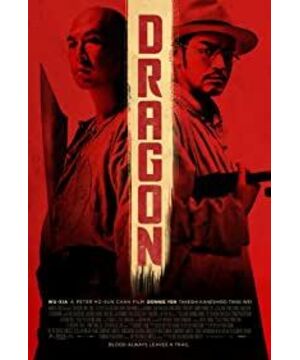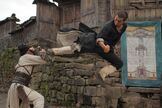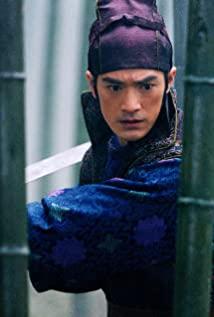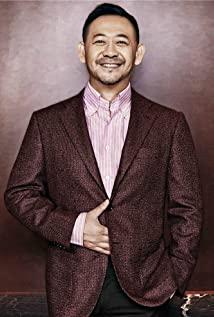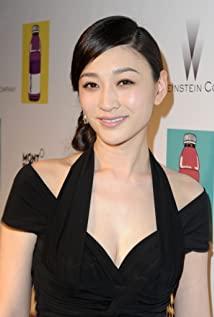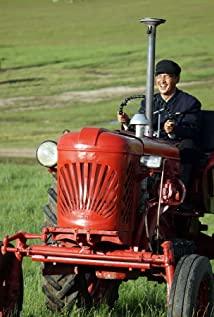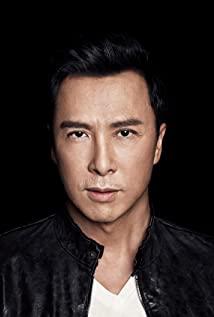But it's not all propaganda. I checked the trailers in mainland China, Taiwan, and Hong Kong on the Internet (the release times of the three places are July 4th, 22nd, and 28th respectively), and there are really some differences. The difference is not in the content, but in the language. ----Wait a minute, I'm talking nonsense, please take a look at this comparison table first, and see what the protagonists have to say in each version:
1. Liu Jinxi (Donnie Yen): general, general, and Cantonese.
Second, Xu Baijiu (Jincheng Wu): Sichuan, Sichuan, Guangdong.
3. The leader of Western Xia (Wang Yu): general, general, general.
4. Thirteen Niang (Hui Yinghong): General, General, Cantonese.
5. The county magistrate (unknown): Bei, Pu, ? .
(The order is the mainland, Taiwan, and Hong Kong versions.)
Several interesting phenomena: (1) Sichuan dialect is missing from the Hong Kong version. Xu Baijiu and Liu Jinxi speak the same Chinese dialect, which is Cantonese. (2) Liu Jinxi's Wang Yu Laodou does not speak Cantonese in the Hong Kong version, but Mandarin. (3) But Wang Yu's wife speaks Cantonese again. (4) The language distribution of the Taiwan version is the same as that of the Lu version, the only exception is the county magistrate (the one who announced "the matter is done"). The version speaks ordinary Mandarin, and the Hong Kong version of the county magistrate's situation is unknown.
It shouldn't be hard to see the business calculations behind it. In a simple sentence, Chen Kexin uses language to separate the market, but also uses language to create the market, and even consolidate the market. The role assignment, presence or absence of each language in each version makes sense. Just talk about my opinion.
First, why is Sichuan dialect missing from the Hong Kong version? The answer should be obvious: Sichuan dialect (actually Southwest Mandarin) has a "selling point" in the mainland, and the market is bigger, but not in Hong Kong.
Southwest Mandarin is relatively close to Mandarin, is it because mainland audiences are more used to it, and it is easy for audiences from both north and south to understand, and there is a sense of local intimacy? As for Hong Kong, because Mandarin is still being actively promoted, if one of the protagonists is allowed to talk in Mandarin with medical terms, the audience will probably feel exhausted, not to mention the more unfamiliar Southwest Mandarin.
Second, why did the Taiwanese version let Takeshi Kaneshiro speak Southwestern Mandarin?
The answer should also be obvious. Movies from ancient to modern China and foreign countries, as long as they are movies, come to Taiwan, and they will always be accompanied by subtitle cards for you. Audiences are also used to reading subtitles from a young age. Therefore, even if Takeshi Kaneshiro speaks Japanese and Martian, Taiwanese are "not bad". Moreover, Mandarin or Mandarin is fairly well implemented in Taiwan.
Teaching Takeshi Kaneshiro to speak the Southwestern Mandarin also has a dramatic effect of alienation: teaching Xu Baijiu from the language will isolate him from the people around him as soon as he opens his mouth, making him a strange and out of place. The audience sees his strange appearance and peculiar language, and naturally expects him to do some unreasonable things. The so-called "monks who come from afar will recite sutras" is also true. In this way, it will be easier for the audience to accept Kaneshiro Takeshi in the play talking about science.
Third, why didn't the Lu version and the Taiwan version reverse the language relationship, letting Jin Chengwu speak Mandarin and the villagers in Liu Village speaking Southwest Mandarin?
This question is difficult to answer. From the perspective of the relative speed of the spread of "science" in the late Qing and early Republic of China, the language distribution relationship I mentioned should be more realistic. The director and screenwriter did not do this, but turned the reality over, why? I don't think Chen Kexin intends to disrupt, I think it's still market considerations. Because the primary market is Mandarin audiences, Takeshi Kaneshiro is not the first protagonist after all, and this film is not a dialect film after all. It is said that "Let the Bullets Fly" has a Sichuan dialect version. If "Wu Xia" follows it, it may become that Jincheng Wu speaks Mandarin and Donnie Yen speaks Sichuan dialect.
Fourth, the previous article said that Chen Kexin used language to defamiliarize the characters, which was beneficial to the plot; if so, why did he not do this in the Hong Kong version?
This question is not easy to answer. I guess there are two reasons. (1) The benefits brought by defamiliarization are only beneficial for plotting out the plot. It is a greater benefit to make it easier for the audience to understand and understand, with a sense of belonging and security, and willing to go to the cinema. You don't even go to the cinema, can you still talk about the plot? (2) The Cantonese-speaking area was the first to become popular, and the contact with Western culture was earlier. Teaching Xu Baijiu to speak Cantonese may be more in line with historical reality than Mandarin. The Hong Kong audience must have a strong consensus on this point.
Fifth, when it comes to the sense of belonging and the truth of history, the Lu version speaks a language (Mandarin) with the Taiwan version teacher Liu Jinxi, namely Tang Long and his father, the unknown Xixia sect master. This makes sense, but why does the Hong Kong version The leader of Xixia does not speak Cantonese but speak Mandarin? His wife (not Tang Long's biological mother) speaks Cantonese again?
This question is even more difficult to answer. Many people must think of sensitive culture and even identity issues (the leader said to "Tang Long", "Your blood is mine! His blood is also mine!"). Don't say that. Put it from another angle.
The era of this movie is set in the sixth year of the Republic of China (one year earlier than "Let the Bullets Fly"), but it is strange, why does it seem to be in the Qing Dynasty? The most eye-catching thing is that the men in the village all wear braids. The braid is obviously a symbol, symbolizing the Qing Dynasty, the old society, patriarchal power, imperial power, and so on. This is the tradition of Hong Kong films. For example, in Chen Kexin's "House of Flying Daggers" last year, the master of the big house is the braid that protects him the most. Once the braid is cut, the momentum immediately dissipates. The leader in "Martial Arts" also has a thick braid, which is first tied in a twist on the back of the head, and then hung proudly on his back (it would be difficult to think of phallic worship). Just seeing the braid on the back of his head makes him tremble with shock. But when we look back, although Liu Cun in the film also has braids, although it is obviously a "feudal" society of ethics, it seems to be okay. The number of patriarchs has a round-table collegiality system, and decision-making is transparent and reasonable. The villagers live and work in peace and contentment. Although they have a lot of etiquette and education, they do not eat people. Although they are a feudal society, they are not inequitable. This shows what? The focus is not on the symbols, concepts and institutions of braids, old-fashioned, feudal, patriarchal, etc., but on what he has done. The same is true of those who keep braids, and the same is true of those who speak Mandarin. It's because I hate this person, so I teach him to speak Mandarin, but that doesn't mean everyone who speaks Mandarin is annoying.
Sixth, what is the sensitivity of the county magistrate? Why are there language differences?
This question is particularly interesting, and the answer is not as sensitive as one might imagine. I guess it's because of this: in the mainland, teaching the county magistrate to speak the northern dialect may strengthen the intimacy of the country? But in Taiwan, it's definitely different: Northern dialect doesn't have any market in Taiwan, because traditionally in Taiwanese dramas speaking northern dialect is either an old man or a warlord, and the audience has already formed a stereotype. I guess Chen Kexin just didn't want the audience to have a particularly bad impression of the Republic of China, so he made such a language assignment.
As for the so-called "science" of this film, I don't think it's very impressive, it's just a trick. Think of the previous year's Hollywood movie "Sherlock Holmes", where Sherlock Holmes used science to explain martial arts when he ended up fighting freestyle. Sherlock Holmes was earlier. More importantly, Hollywood's scientific boxing theory is a complete set (hit the opponent first to cause A effect, and then because of the A effect, hit him elsewhere to cause the B effect, and so on). The simple physiological mechanism of killing people by hitting the temples should not require special simulation animations for popular science, right? Bruce Lee made it clear decades ago. Moreover, when he really needed him to come to popular science, such as "how changes in body mass are achieved to cause light effects", he didn't talk about it, and he didn't make any animations. Not to mention what is "external air"? What kind of physiological phenomenon is the "iron shirt"?
The more exciting part of this film is reasoning (but the foreign film "Sherlock Holmes" of the previous year also has reasoning and suspended animation). It's a pity that it fell short, because the camera betrayed the director and the audience. ---- The fighting process that Xu Baijiu imagined is very different from the plot created by the camera at the beginning.
Another interesting aspect of this film is the discovery of the Xixia people. I really want to congratulate the audience, after the national film has been silent for a long time, a bloodthirsty and cruel gang member has finally been added. This Xixia gang should not have fallen from the sky. Was it inspired by Taiwanese writer Luo Yijun's "Xixia Hotel"? The styles of Luo Yijun and Chen Kexin are really similar, maybe they will cooperate in the future. Taiwanese writers Zhang Dachun and Wong Kar-wai don't cooperate?
View more about Dragon reviews


